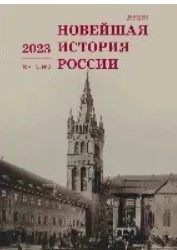Формирование «советской модерности» и региональная элита в 1960–1970-е гг.
The Formation of “Soviet Modernity” and the Regional Elite in the 1960s–1970s
Author(s): Viktor Viktorovich Kondrashin, Olga Aleksandrovna SukhovaSubject(s): Social history, Politics and society, Social psychology and group interaction, Post-War period (1950 - 1989), History of Communism, Politics and Identity
Published by: Издательство Исторического факультета СПбГУ
Keywords: Penza region; USSR; society; regional elite; regional identity; late Socialism;
Summary/Abstract: Based on the materials of the Penza region, the problem of the formation of “Soviet modernity” in the consciousness and practices of political management of the regional elite during the 1960s–1970s is considered. The authors agree with M. David-Fox’s position on Soviet modernity as another type of industrial society, ex-pressed through ideological and cultural representations and behavioral strategies established in the minds and psychology of the elite and society as a whole. The analysis of recruiting, social composition, mental attitudes and aspirations of the regional elite, the results of regional identity formation in the 1960s–1970s was carried out on the basis of the sources of mass origin, documents of Party and Soviet governing bodies, diary records and memoirs. The chronotope of development of the Penza region in this period was due to the later terms of the territorial organization, the processes of industrialization and regional specialization of industrial production. The general trend of changes can be characterized as a situation of unprecedented and unrestrained, in some ways rampant industrial construction, construction of housing and social and cultural facilities. The most important conditions for the formation of the local elite as carriers and generators of new attitudes and values are considered: the socio-economic transformation of the region, its transformation from a backward agricultural to one of the centers of the military-industrial complex of the USSR; as well as the process of mass promotion of leaders in the 1950s–1960s. Most of them were natives of the Penza region, people 30–40 years old, came from the workers and peasants, with higher, usually technical, education, hard military youth, about one-third — participants in the Great Patriotic War, about half — former Komsomol leaders.
Journal: Новейшая история России
- Issue Year: 13/2023
- Issue No: 44
- Page Range: 664-677
- Page Count: 14
- Language: Russian

